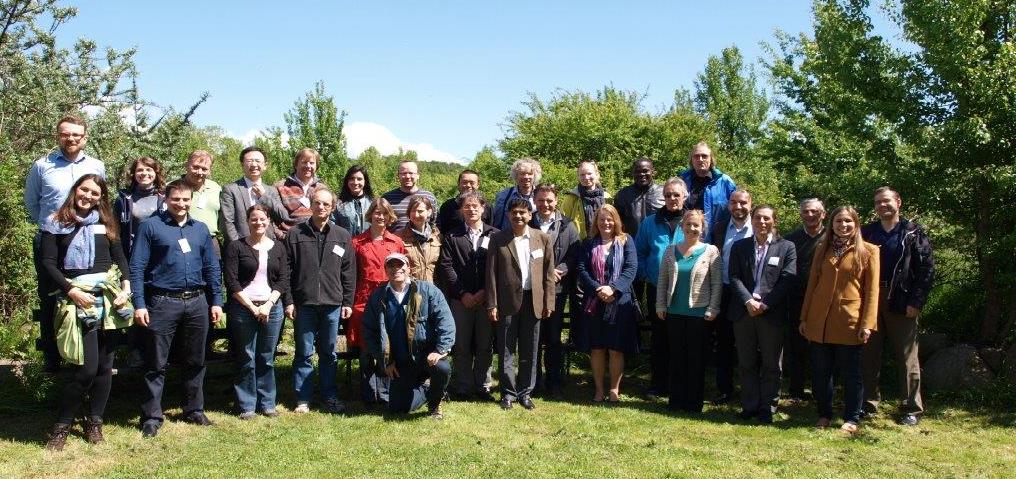Vilm, 30 May 2013
The international workshop on TEEB country studies: Learning from experience and how to utilize TEEB results, brought together experts from science and policy, involved in facilitating and implementing TEEB country studies. The workshop took place on the Isle of Vilm, Germany from 21 to 24 May 2013 and was attended by 25 countries and international partners including the European Commission, the European Environmental Agency and Deutsche Gesellschaft für International Zusammenarbeit (GIZ).
The workshop objectives were to:
- Share experiences about the implementation and use of national TEEB processes;
- Discuss how best to capture and further develop international TEEB related initiatives and support national TEEB processes, including how to link TEEB to the implementation of the CBD Strategic Plan, EU Biodiversity Strategy and other relevant policies;
- Initiate a discourse on how to utilize TEEB results for development planning and foster sustainable use of ecosystems and biodiversity at all levels; and
- Improve collaboration, cooperation and synergies among TEEB implementing countries.
The workshop built on the results of previous events such as the 2011 Vilm Workshop “Exchange on TEEB processes in European Countries”, the TEEB Conference 2012 and the 6th Biodiversity in Europe Conference .
The workshop was jointly organized by the United Nations Environment Programme, German Federal Agency for Nature Conservation (BfN), Helmholtz Centre for Environmental Research and Alterrra Wageningen University. The new TEEB Guidance Manual was presented and discussed with countries at the workshop.
Summary of workshop proceedings
Discussions on the first day of the workshop focused on key reasons for undertaking a national TEEB study, main policy questions underlying the TEEB study, the governance structure and how to utilize results. The Nordic Countries, India, Germany, Brazil, the Netherlands, Switzerland, Croatia and Lithuania shared their experience.
In Brazil for example participants heard that in order to advance the national TEEB agenda, collaboration was established between the Ministry of Environment and other government ministries and agencies such as the Ministry of Finance. In India the results from the national TEEB study led to the creation of a Forest Grant Programme and the establishment of an expert committee on Green National Accounting. Whereas in the case of the TEEB Nordic Study, the early involvement and leadership of the Nordic Council of Ministers influenced the start-up of the study. Furthermore participants learnt that the results of this regional synthesis influenced and provided a strong reason for the initiation of the TEEB Finland study, which will inform the Finnish Green Economy Strategy
Most countries mentioned they have ensured that TEEB country projects link with policy objectives such as poverty eradication, energy policy and the greening of the economy. Several presenters highlighted the importance of linking TEEB with international obligations such as the CBD National Biodiversity Strategy and Action Plan (NBSAPs) revision process.
The countries also discussed the challenges to undertaking TEEB Country Studies and proposed some solutions such as early stakeholder involvement. Heidi Wittmer (UFZ) introduced the TEEB Guidance Manual and emphasized the importance of framing within a policy context and going through the “6 steps” of implementing TEEB at the national and sub-national level.
The UNEP-TEEB office presented current activities underway to ensure synergy, cooperation and support to countries such as producing a TEEB training package, compiling a country database, organizing regional workshops and support of sectoral and biome studies.
Finally due to the increasing country interest about TEEB and natural capital accounting, a session was dedicated to discussing the linkages, including other initiatives such as the System of Environmental-Economic Accounting (SEEA), the World Bank’s Wealth Accounting and the Valuation of Ecosystem Services (WAVES) and the EU Pilot Study on Natural Capital Accounting.
Conclusions – Messages from Vilm
- TEEB is more than economic valuation:
- Economics is the relationship between humans and ecosystems services, choices, public goods, trade-offs
- Complimentary argument should complement not replace other arguments
- TEEB is an instrument rather than a goal: it can help address policy and management concerns
- TEEB is not (just) a study but a process:
- “Valuation as conversation” Kai Chan, University British Colombia
- Dialogue in society to decide the kind of life we want to live : globally, nationally, regionally, locally
Workshop documents
Policy Brief: TEEB country studies implementation, integration and utilization
Press Release (German):
Photo Gallery on flickr
Interviews of participants

